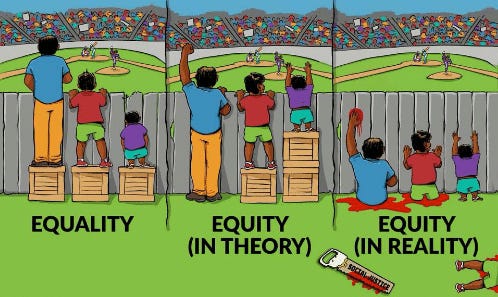

This is a companion piece to my interview with Kathryn Paige Harden, author of The Genetic Lottery, a brilliant rumination on genetics and its implications for our ‘meritocratic’ economy. Due to the complexity of the subject (or my amateurish interviewing and a considerable esprit de l’escalier), I’m appending a commentary on the interview here.
O me! for why is all around us here,
As if some lesser god had made the world,
But had not force to shape it as he would.
—Alfred, Lord Tennyson, ‘Idylls of the King’
It’s fairly common for words to go from having a positive or neutral connotation to a negative one. Take the very appropriate example of ‘smug’: it once meant ‘trim, smartly dressed, neat’, and eventually came to mean someone too enamored of their own achievements or stature. The reverse is rarer: we don’t often imbue positive meaning to something that was once a pejorative. A prime example of this linguistic retrofitting is ‘meritocracy’: once a neologism coined in a political dystopia novel meant to satirize the class which it described (a portmanteau of ‘merit’ and ‘aristocracy’), it’s now proudly bandied about by everyone from elites to educators.
Who could possibly be against ‘merit’? It would be like opposing happiness or security. But that’s the genius of this new gloss to the original term: you’re doing all sorts of introductory throat-clearing before you even get to the main point about what ‘merit’ even is, and how our our current conception of it might be lacking.
Take the retrospective comments by Michael Dunlop Young, author of the original The Rise of the Meritocracy, on observing meritocracy be enshrined as the summum bonum in the Blairite politics of his final years:
It is good sense to appoint individual people to jobs on their merit. It is the opposite when those who are judged to have merit of a particular kind harden into a new social class without room in it for others.
Or to put it more bluntly, picking someone from the Andover-Harvard-McKinsey assembly line isn’t going to help you deal with Pasthun tribesmen in Afghanistan (or anything outside of the elite bubble really), because they’re just hoop-jumping gunners with little in the way of civic virtue or intellectual breadth. To elevate a certain kind of analytical smarts, which happen to work well in a technologically-enabled society of consumerism and transactionalism, as the absolute measuring stick of merit is one-dimensional and, frankly, obtuse.
For most of human history and across many cultures, what defined either moral or civic virtue included a portfolio of qualities, including but not limited to loyalty, earnestness, honesty, steadfastness, abstemiousness, industriousness, grit and many more. Even hard-nosed Machiavelli with his princely virtù stipulated that the ideal leader should possess traits of bravery, skill, forceful dynamism, and a willingness to undertake anything to secure the interests of the state (qualities seemingly absent from our current crop of ‘meritocrats’). Does the SAT or the current batch of fashionable extracurriculars measure any of that, you think?
Worse, the sham meritocracy provides moral justification for whatever feedback loop of nepotism and credentialism ends up locking in what’s now at best an oligarchy.
Again, Dunlop Young with Blair as British PM:
If meritocrats believe, as more and more of them are encouraged to, that their advancement comes from their own merits, they can feel they deserve whatever they can get. They can be insufferably smug, much more so than the people who knew they had achieved advancement not on their own merit but because they were, as somebody's son or daughter, the beneficiaries of nepotism. The newcomers can actually believe they have morality on their side.
Or as I wrote in Chaos Monkeys as one of my laws of Silicon Valley: meritocracy is what we use to bless the charade.
One of the high-level moral lessons I drew from Harden’s The Genetic Lottery (as well as related works like Freddie deBoer’s The Cult of Smart) was that we need to take a broader view of human moral value. We have equated the value and dignity of a person with their value to the economy in a way no politics or religion before us ever has.
Again Smith:
It is hard indeed in a society that makes so much of merit to be judged as having none. No underclass has ever been left as morally naked as that.
What’s wrong with being a welder or skilled machinist? I mean that completely non-ironically. They make good money, and their skills are much in demand. The well-pump guy on Orcas Island (where I once lived) made a bundle1, lived in a paradise, and had a life that most of the frazzled, anxious ‘smart’ Silicon Valley people could only dream of. Why would we maintain an educational policy that forces that guy into getting some BS (pun intended) degree that will leave him in massive debt? What’s so damn magical about ‘knowledge work’ (read: looking at screens all day) that we feel every member of society must partake to feel fully human?2 A better vision of education (one enunciated very clearly by Austen Allred of Lambda School in his Pull Request interview) is one where every individual is offered the ideal track for their own prosperity and human flourishing, and that’s not necessarily the track the DC elites who make education policy took to get where they are.
I would advocate for a complete abandonment of the term ‘meritocracy’, or a return to its original satirical meaning. Meritocracy, as it actually exists in the world, is bad actually. And thinking that it has anything to do with actual merit is like thinking ‘communism’ is actually about egalitarian communes. Let’s stop being naive (or deceptive) about it.
Ok, but what do we do about those people who are inclined to the intellectual or technical side of education? We are not launching some Ted Kaczynski-esque Butlerian Jihad against technology anytime soon, and we’ll indeed need engineers and biologists and physicians aplenty. How can we even tell where someone would flourish most, whether skilled craftsman or programmer? The moral reorientation I (and Harden to my reading) call for above would be at best gradual: what do we do about the controversies happening right now around equity and selective schooling?
Here of course is where we get into the more practical (and controversial) aspects of Harden’s book, issues she does not shy away from (again, I highly recommend it). Figure 8.3 in the chapter ‘Alternative Possible Worlds’ summarizes well both reality and Harden’s view:

Above we have what’s more or less the status quo right now, which is that those with a high penchant for education manage to more or less find those resources (either privately, or via the public school system), and everyone performs somewhat up their ability.
Alternative #2 is one idealized outcome: given smarter public policy as a result of sorting out the impacts of both genetics and environment, everyone is pushed to the educational maximum. The average outcome is higher for all concerned, but so is inequality of outcome. Harden references a common online meme about equity to make a point about how equity should work.
Of course, the meme is somewhat inaccurate in that, along certain dimensions like education, the outcomes might not be the same for everyone; rather, public policy has bolstered everyone up to a common level of flourishing in all its forms.
Alternative #1 is what we’re actually doing now: focusing so much on driving precisely equal outcomes, even if it means outright hamstringing potential top performers. The average society-wide performance does indeed go up, but the variance in outcome is squeezed down to a minimum. Excellence, in all its forms, suffers. That world looks more like this trolly version of the above meme:
Consider a very close-to-home San Francisco drama: for the past year and a half, the SFUSD school board has been busily engaged wrecking the city’s one merit-based public school, Lowell High School. The entrance exam was originally suspended using the COVID pandemic as pretext, but many (including myself) suspected that was simply a setup for another maneuver in the ‘equity’ playbook. Indeed, that’s exactly what happened and school board leaders like Ali Collins and Gabriela Lopez waged a long-running campaign against the exam-based admissions of Lowell.
Before my soul couldn’t take it anymore, I used to dial into the SFUSD board meetings via Zoom. When the issue of Lowell came up (and it was often postponed in a passive-aggressive move to table the issue), it was absolutely heart-wrenching. Parents would put their kids on, and and they’d talk about how much they were looking forward to go to Lowell. One kid, I forget his name, came on and in the earnest tone of an anxious eighth-grader and said: my parents aren’t rich, I studied hard, this is my one way out. And they listened to all that feedback from parents and students, and went ahead and wrecked the school a few months later anyhow.
In New York, outgoing mayor Bill de Blasio announced he was phasing out the city’s gifted programs3. There might be hope however: incoming NYC mayor Eric Adams has vowed to restore the city’s gifted programs, and the SF school board responsible for the Lowell demolition is currently facing a recall election. Broadly, parents across the nation are rebelling against school administrators too eager to experiment with the education of other people’s children.
If we’re going to create a mandarin class of the purely intellectually endowed (possibly at the expense of other virtues), well then…let’s fucking go. Let’s do it for real then and select an elite picked on brains alone. I suspect the outcome will not be as snow-white as many detractors of merit-based admissions assume (as indeed, the workforces of Silicon Valley companies reflect).
The real beneficiaries of the current equity program are rich mediocrities who will manage to coast ahead of the poor, smart and determined kids who would otherwise academically eat them alive and ultimately replace them in the elite firmament. Recall again that Lowell was majority Asian, and whites were actually under-represented (the school was 82% minority). The animus against Asians in higher education bears an obvious comparison to the quotas around Jews in the Ivy League that prevailed well into the 1960s (and at schools like Yale who are now the biggest enforcers of the equity agenda). The difference now is that discriminatory admissions is not done in the name of WASP xenophobia, but in the putative name of ‘equity’. We live in the Golden Age of Irony if nothing else.
For all the supposed meritocracy—a charade even the left plays along with—our society resembles an oligarchy far more than the aristocracy of the meritorious. Aristocracies, for as odious as they might seem to democratic minds, at least possessed a certain level of noblesse oblige to wider society, something seemingly absent in the current crop of meritocrats. Individual accomplishment within a collective baseline of universal human dignity and possibility should be our goal; not a forced equality of outcome imposed on the middle and lower classes that the affluent evade via wealth and private education.
In the end, a society that makes equity the enemy of excellence will not produce much of either. And a society that only grants dignity to those of service to an increasingly specialized economy will eventually be rejected by those deemed inadequate by their supposed meritocratic betters. Arguably, that’s exactly what we’re seeing with the rise of populism all over the world. Such political dramas don’t typically end with the feel-good vibes of online equity memes.
This is a free post. Please subscribe to get access to the interviews and various other subscriber-only posts.
I paid $130/hour for his services and he was booked out weeks ahead. He’d disappear to go fishing in Alaska at random times and you just had to deal. He had a comfortable house, family, zero concerns about crime or affording anything, and brewed beer in his spare time. What do I put in my LinkedIn to land his gig?
A fascinating rumination on the nature of work and how the manual trades are studiously dismissed by the college crowd is Shop Class as Soulcraft: An Inquiry into the Value of Work by Matthew B. Shepherd. Shepherd, who held a PhD and worked as a policy wonk inside a think tank, left all that behind to open a motorcycle shop.
From the linked NYT piece: “Though about 70 percent of the roughly 1 million public school students in New York are Black and Latino, about 75 percent of the roughly 16,000 students in gifted elementary school classes are white or Asian American.” Note how Asians get bucketed together with whites to give the impression that there’s some sort of overt segregation going on. A similar split happens when Silicon Valley companies report diversity stats, and Asians suddenly don’t ‘count’ as minority.














Every civilization has had priests whose job it was to maintain the state mythology. Ours is no exception. We simply pretend they aren’t priests and that ours isn’t really a religion. The idea of separation of church and state might be fundamentally flawed: it might be impossible to separate the two. At best we can pretend we’ve done so.
It doesn't surprise me that this highschool is doing away with merit, much like many colleges are starting to.
I'm about 4/5th of the way through Chaos Monkeys. I'm liking what comes across as a mix of personal honesty and cynicism, as much as witty characterizations that go throughout.
After this,
"Meritocracy is the propaganda we use to bless the charade"
You say soon after,
"Capitalism is an amoral farce in which every player-investor, employee, entrepreneur, consumer-is complicit"
I think that worse things happen when you suppress the natural outlet to power.
"There are worse ways of monetizing sociopathy than startups. If you know better ways, I'm listening" (p. 148).
Denying meritocracy in education is withholding an outlet for children to prove their intelligence. Moreover, it's denying manhood in itself: be smarter, be rich, be fit, be funny, to get that better mate. I'm not sure how familiar you are with the whole redpill/etc community but all this is a backlash to the coddling from school authorities growing up. When you were ousted from the apple job, people treated your book like an incel manifesto for convenience's sake. Tattletelling to the teacher, someone said something bad.
I think that it's not surprising there's an increasing rate of women are graduating college more than men. It comes after decades of an equity movement for women. People tell boys from a young age that everything a man becomes is evil. Frankly, I see defeatism in the self directed cynicism you have towards yourself as a startup founder. I know you're purposely exaggerating, which is why it hits the mark. Feeling the necessity to demean yourself as a man for wanting money is a new cultural fad. Social justice is the charade that the corporate machine enacts moreso than pure meritocracy.